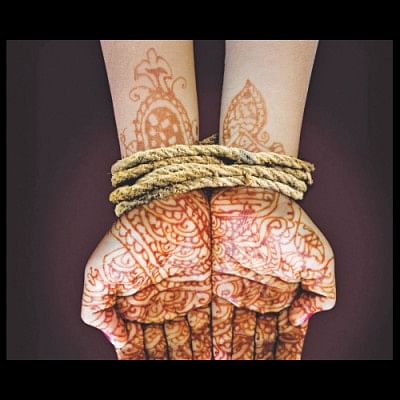In the name of honour...

‘Honour killing' is an iconic oxymoron, going beyond all logic, implying that somehow there happens to be 'honour' in killing a family member.
On July 15, 2016 the murder of Pakistani social media star Qandeel Baloch left the whole world dumbfounded as she was killed for living life the way she pleased. The victim's brother nonchalantly and without remorse publicly confessed having drugged and strangled her. Beyond the underlying hopelessness of the whole endeavour what is even sadder is that this particular case has turned heads and taken social media by storm only because the victim herself had been a talk of the town for a long time.
Since time immemorial it has been proved that women are not safe simply because they are women. There are examples of men being killed for practicing homosexuality or even for acting in a feminine way. Very strategically the society has reserved the moral policing and judgements for females, to be exact, for femininity.
Honour killing, also known as shame killing, is carried out generally on females who have brought shame to the family. The perpetrators are mostly but not exclusively men. Ironically and pointlessly the concept of honour killing blows up on the face of its own foundation. The legal system year after year considers inter-caste marriage to be a valid reason for a family member to kill another. However, the killing itself remains amenable to pardon, honour gets a twisted meaning- where there is deemed no shame in taking away a human's right to live.
Honour killing is quite understandably a result of strong patriarchal views on women. Every raised eyebrow on how a woman should dress, women's submission to male authority, being viewed as property are silent contributors to violent punishments for one gender which has been asking for equal rights for years.
Widney Brown, advocacy director for Human Rights Watch, holds that the practice of honour killing "goes across cultures and across religions." To the surprise of many people it even exists in the jurisdiction of Great Britain, Italy, German, Norway, Sweden but mostly is practiced upon migrant Kurds, Muslims. The archaic Napoleonic Code (Article 324, 1810) permitted murders of an unfaithful wife at the hand of the husband but not the other way around. Even though it has been abolished in 1975, the Middle Eastern countries grabbed the opportunities to adopt and implement this sexist, unequal and anti-human rights piece of legislation to overpower women.
Even to this day Jordan's Penal Code of 1960 in Article 98 states, he who commits a crime in a fit of fury caused by an unrightful and dangerous act on the part of the victim benefits from a reduction in penalty. Unbelievable as it may be, only six months is the usual penalty for such killers in Jordan where capital punishment is for murder, terrorism or sexual offence.
The segregation in punishment is an outrageous acquiescence and silent go-ahead gifted by the legal system for an offence. This may be called by a different name and be explicable by the patriarchal overlords, sugar coated as the saviour of honour but is above all nothing less than homicide.
Apparently, in Pakistan the legal heirs of the victim are permitted to forgive the killer in which case he walks free. The newly proposed legislation on honour killings recommends 25 years' imprisonment even if the heirs of the victim pardon the convict whereas under Section 302 of the Pakistan Penal Code the convict in a simple murder case may only get the life imprisonment of 14 years or a maximum of the death penalty. The loophole perseveres as a person may declare it to be a simple murder to avoid the higher punishment. As Tariq Mehmood Jahangiri, a criminal law expert and the president of the Islamabad High Court Bar Association, said the legislation on honour killings would fail to get the anticipated results as the accused may claim that he had committed the murder for different reasons such as a dispute over property etc.
It's a shame to be asking to not be killed for living life according to one's choice. The issue was hidden in plain sight before the society collectively lost Qandeel. Now the ancient laws need to be entirely reformed into one that condemns murder in no matter what form it is from one that remorselessly blames the victims.
The writer is a student of law, University of London International Programmes.

 For all latest news, follow The Daily Star's Google News channel.
For all latest news, follow The Daily Star's Google News channel. 



Comments